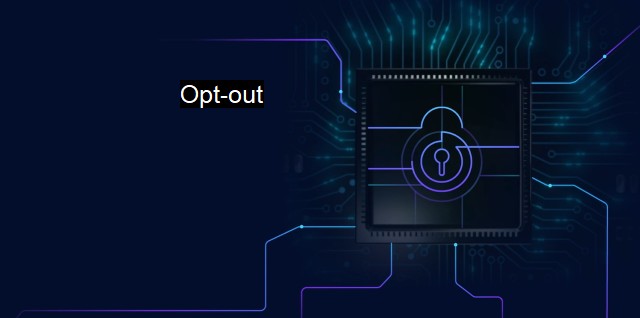What is Opt-out?
The Pros and Cons of Opt-Out in Cybersecurity and Antivirus Protection - Is It Wise to Let Users Choose?
"Opt-out" is a commonly used term referring primarily to the act of selecting not to participate in a program, service, or even system functions. The term is particularly prevalent where it often correlates with services such as newsletters, alerts or antivirus software updates."opt-out" fundamentally implies an exclusion methodology. It outlines the design where systems and software offer services automatically, demanding user intervention to stop, limit or modify them. This policy overshadows various aspects ranging from operating systems, web browsers, and antivirus programs to network protocols and more.
The experience of unending pop-ups promoting an email newsletter subscription or cookies agreement may be a familiar encounter to most Internet users. These are instances of opt-out procedures, where users must actively choose to reject these services. If they don't, they automatically become part of it.
Another way this concept manifests in cybersecurity revolves around antivirus software. Program ecosystems often automatically select users for noncritical software updates or extra built-in features to aid in more coordinated surveillance of potential threats, out of which only few users might be aware. individuals must select the "opt-out" choice to avoid these automatic notifications or subsequent installations of new antivirus software versions. Even though this ensures the user possesses the modern, up-to-date versions on starting, it might cause inconveniences that range from needless alerts to unwanted exertion on device capacities.
Opt-out strategies are a pivot for cybersecurity due to various reasons. Primarily, this technique helps ensure optimal security provision to users. As several users lack the requisite expertise or simply overlook elements important to the maintenance of their cyberspace's health, automated opt-out characteristics act as safeguards. These systems guard their data by ensuring necessary software updates aren't departed on the user's own decision, mitigating risks for potential attacks or malicious trespasses.
Simultaneously, this convention isn't entirely bereft of drawbacks. At times, opt-out habits may inadvertently spur annoyance or misconception among the populace. Ambiguity in how different settings operate and unintuitive approaches to deactivate certain components can make opt-out strategies difficult to resist for less tech-savvy people.
Privacy complications may weave their way in, with some users feeling intruded upon by ancillary elements such as automated data collection or the perception of being constantly watched and evaluated. The paradox here is that these cybersecurity activities were planned to give them more protection, yet they tend to generate a sense of losing privacy among the users who fail to understand their purpose well.
While opt-out shields users against exploits or outdated systems, it might unintentionally harbor the susceptibility to augment ineptitude. This is, when users grow accustomed to auto-enabled precautions, they may become less vigilant and less inclined to update their knowledge about recent threats which could still leak, leading to an inflated sense of security.
The concept of "opt-out" holds a colossal stance within the realms of cybersecurity and antivirus, acting as both a sanctuary and pitfall to users around the globe. The want for personalized control by users, juxtaposed with the obligation for tech companies to provide essential security components, summons the need for user-oriented design, lucid communication, and instructive guidelines regarding opt-out functions. Effectively implemented, the opt-out approach can aid in building a more dependable, secure cyberspace, while obliterating the hovering conceptions of intrusion and overreach.

Opt-out FAQs
What does "opt-out" mean in cybersecurity and antivirus context?
In cybersecurity and antivirus context, "opt-out" refers to the process of choosing not to participate or receive certain services or features, usually regarding the collection of data or sharing of information.How can I opt-out of data collection from my antivirus software?
To opt-out of data collection from your antivirus software, you should check the privacy settings in the software and disable any options that allow data collection or sharing. You may also be able to opt-out of data collection by contacting the software provider's customer support.What are the risks of not opting out of data collection from my antivirus software?
Not opting out of data collection from your antivirus software may lead to the provider collecting information about your browsing habits, search queries, and other sensitive data. This may pose a risk to your privacy and security if your data is shared or sold to third parties, or if it is accessed by cybercriminals.Is it always safe to opt-out of data collection from my antivirus software?
Opting out of data collection from your antivirus software may reduce the risk of your data being collected or shared, but it may also limit the software's ability to detect and respond to threats effectively. Therefore, it is essential to review the software's privacy policy and determine which data collection options are essential for the software to function correctly before opting out.Related Topics
Privacy settings Anti-tracking Ad-blocking Firewalls Intrusion detection and prevention
| | A | | | B | | | C | | | D | | | E | | | F | | | G | | | H | | | I | | | J | | | K | | | L | | | M | |
| | N | | | O | | | P | | | Q | | | R | | | S | | | T | | | U | | | V | | | W | | | X | | | Y | | | Z | |
| | 1 | | | 2 | | | 3 | | | 4 | | | 7 | | | 8 | | |||||||